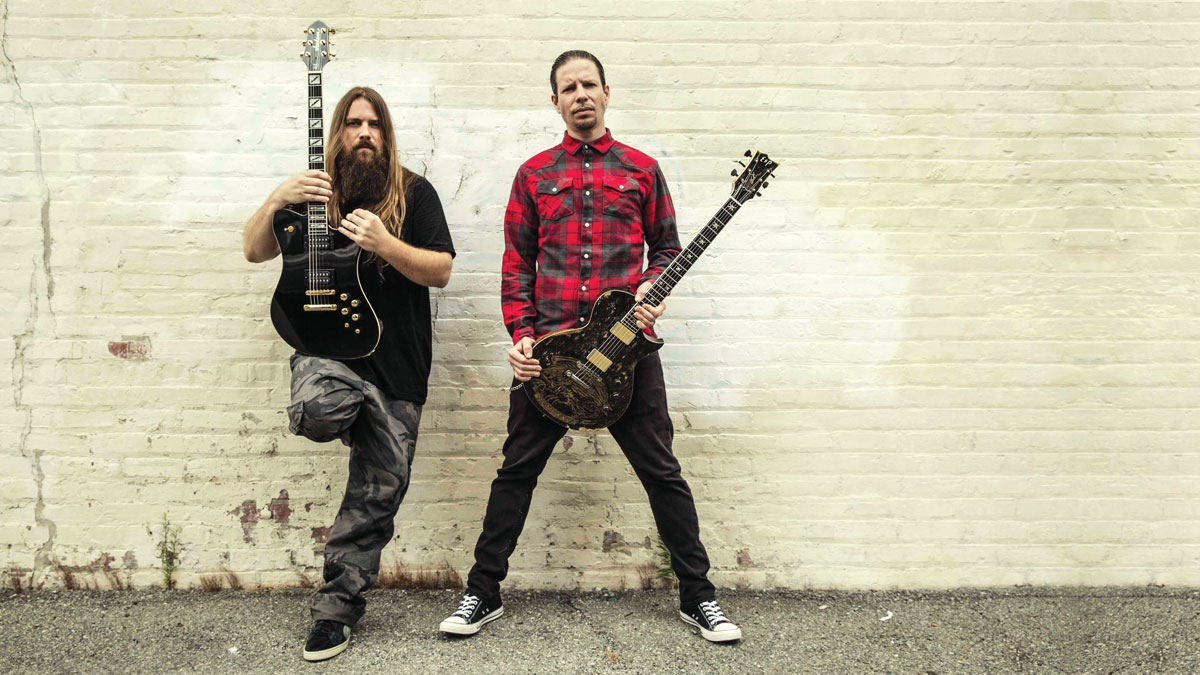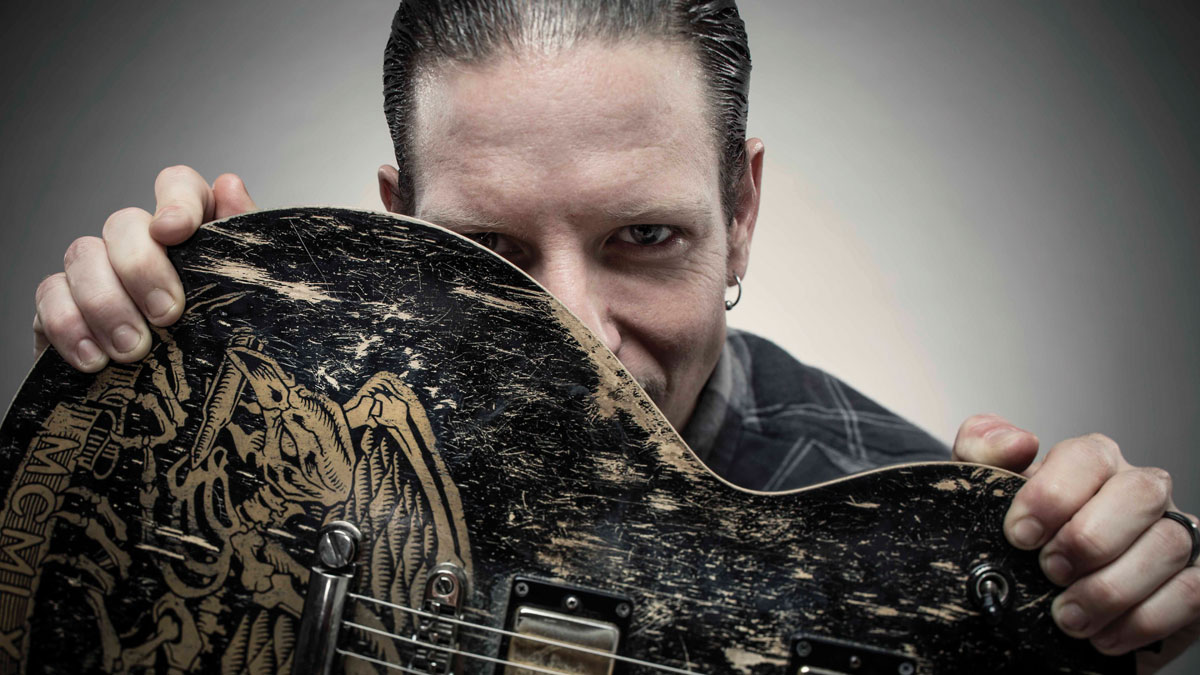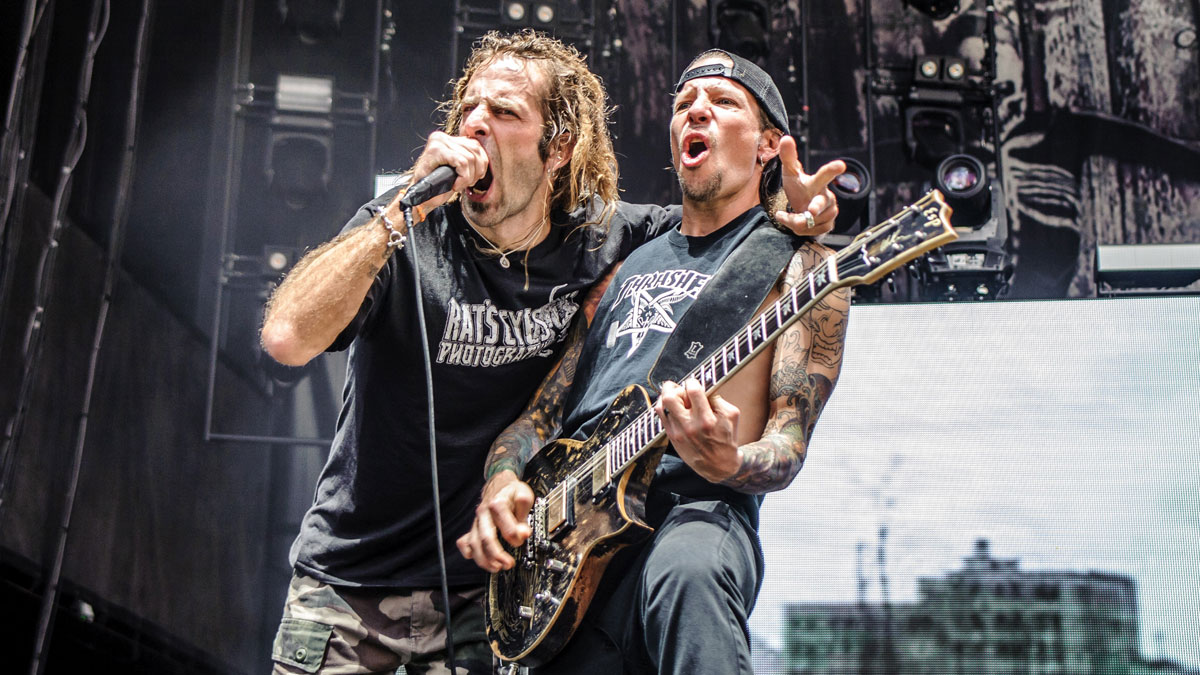Lamb Of God talk new album VII: Sturm Und Drang
Mark Morton and Willie Adler on their latest

Introduction
Mark Morton and Willie Adler have raised the bar for Lamb Of God by working more closely together again, with just a little help from Bon Jovi...
“Everyone we talk to about the new album wants a story line about how this is the comeback album,” sighs the straight-talking Mark Morton.
“But it would be unfair to characterise it as that. By the time we started putting these songs together, we had already been touring and playing together [again], so this was the next thing for us to do. There are references in Randy’s lyrics to what happened, but this was the album that we were going to make.”
"It's Lamb Of God’s strongest record since 2004’s Ashes Of The Wake, and for a band who have yet to misfire on record, that’s some achievement"
Any fan of Lamb Of God, or indeed heavy music in general, who hasn’t been living under a rock for the last few years will be aware of what had happened. Frontman Randy Blythe’s 2012 arrest in the midst of the Resolution tour was a shock for the band and the metal world.
Then his five-week custody in Prague’s Pankrác prison, trial and subsequent acquittal from intentional bodily harm charges relating to a 19-year-old fan’s death following a 2010 gig in the Czech Republic capital took the vocalist, and the band, to very dark places.
Mark and Willie Adler have already said all they need to on those events (and Randy has a book out on his experiences this month), but they still loom heavy over VII: Sturm Und Drang (a German term translating as ‘storm and stress’) - especially in the song 512, named after one of the cell numbers Randy was held in during his Prague confinement.
The story for us now is how Willie and Mark have helped compose Lamb Of God’s strongest record since 2004’s Ashes Of The Wake, and for a band who have yet to misfire on record, that’s some achievement.
Their unique blend of unorthodox technical speed metal and greased-up Southern blues groove has never sounded quite this imperious and cohesive on record. But even on a concise and old-school 10-song album, tracks such as Overlord and Embers also stay true to their fearlessness: musicians willing to break into new territories while pleasing their loyal congregation.
But don’t expect any bravado from this duo. “Writing riffs... it’s kind of what I do,” reasons Willie. But as we’ll find out, there’s more to making LOG fire on all cylinders than that.

Riff for riff
The two of you have always been the primary songwriters, but did you change the way you worked together for this record?
Mark: “The amount of material Willie and I brought in that made it on the album is the same as it always was, but the difference is there are very few songs on this album - I can think of maybe one or two - where I did all the riffs, and it’s the same with Willie. We brought them in a little more open-ended.”
"When we got down to it, it really was the most collaborative we have been since Ashes" - Willie
Willie: “There were a lot of ideas - I don’t want to say they were unfinished necessarily - that were purposefully brought in, on my part, because it would benefit me to hear what Mark would have to think about it. And we hadn’t done that really since Ashes, so when we got down to it, it really was the most collaborative we have been since that record.”
Mark: “Even on the last couple of albums, our producer Josh [Wilbur, LOG’s producer since 2008’s Wrath] would be like, ‘We need a couple of songs where it’s both you guys directing, because I feel like there’s two sides here. I can hear Mark’s songs and Willie’s songs and I kind of miss that As The Palaces Burn feel when it’s both you guys exchanging, riff for riff.’
“So I remember having exercises on Wrath and Resolution where we’d say, ‘Okay, we’re going to write a song together on purpose.’ This time, we just did more of that, as opposed to, ‘This is my song and I’m sculpting it; you guys play this.’ Which is cool, because I like that,but it made for a different character this time around. In a good way.”

Solo overlord
The first half of Overlord is especially different for you. Did that still evolve in a traditional way for you?
Willie: “I think Overlord was being tossed around a few years ago, something I was working on and we developed it when we got together and all of us got our hands on it. We came together over that song in a way we really hadn’t before over a tune. Not in a purposeful way to stray from what we normally do.”
"When I play for recreation or whatever, I should be jamming with Blackberry Smoke!" - Mark
Mark: “That song was written in the same process as all the others. It wasn’t like we had nine or 10 full-on metal songs and then this one oddball. Willie had the first couple of riffs in it, in the first or second week of us writing.
“Then we got legs underneath of it and everyone added their part. Randy got a hold of it. We changed the chorus a little bit later. It stands out because of the melodic vocal, but the writing process was very much the same.”
Did you enjoy soloing over the lower pace on that one, Mark?
Mark: “It’s great, because I got to be myself! That’s the kind of player I am. When I play for recreation or whatever, I should be jamming with Blackberry Smoke! That’s the kind of stuff I’m really into. Not that I’m not into metal, but at the root of things, I’m kind of a blues-rock player. Overlord was a great canvas for me, instead of just hinting at that, I could just do it.”

Stool solos
What was the general soloing approach this time?
Mark: “For the last couple of albums, I really don’t have anything worked out for the leads, but I know where they’re going to be and through rehearsals, I’ll have an outline, a storyboard if you will, of where I’m going to be on the neck, [where] the rise and crescendo of the solo will be.
"We’re playing back 512 and I’m thinking, ‘Man, what did I do to myself?! I need a stool for that solo!" - Mark
“But in terms of the licks and what I’m playing, I get a day or two with Josh and we work them out. And I’m pleased. But the flipside is I have to go and learn everything after the studio. So we’re playing 512 and I’m thinking, ‘Man, what did I do to myself?! I need a stool for that solo!’”
Are you now in a place where you feel comfortable with your instincts as a lead guitarist?
Mark: “A long time ago, I admitted to myself that I’m never going to be the most technical guy, I’m never going to be the fastest guy on the scene. But I do feel in the past five or six years I’ve got to a place where I have a voice... It sounds like me and that’s cool. I play honestly: what I hear and what I feel. It’s a good place for me to be.”

Livin' lead
Willie, did you contribute much lead?
Willie: “Melodic additions, like 512 and the re-intro to the second verse. Little things here and there but nothing like my man over here.”
Let’s talk about the talk box lead on Erase This - it’s really good to hear someone flying the flag for that effect again...
"I’d love to tell you that the inspiration for Erase This was Joe Perry or Slash, but it was Richie Sambora"
Mark: “What happened with the talk box was this, and it’s the God’s honest truth. We took a break and I drove up to 7-Eleven to get a drink and in the rental car, Livin’ On A Prayer comes on the rock station or whatever I had on in the car. So I’m listening to it, driving around in California and noticing how that song is all keyboards and vocals; there’s really very little rhythm guitar but there is the talk box.
“I asked Josh, ‘Who produced Slippery When Wet with the weird 80s production?’ Josh said, ‘No way! It’s so weird you mentioned Livin’ On A Prayer because I was just listening to this part and I thought we should try talk box on this.
“Then you walk through the door and ask me about a song that has a talk box on it. We gotta do it!’ I’d love to tell you that the inspiration for that was Joe Perry or Slash, but it was Richie Sambora.”

Bite of the lamb
Tonally, there’s a little more mid bite on this record. Is it still all Mesa/Boogies?
Mark: “It is: Mark IVs, Vs and the Royal Atlantic. I did all the leads with the Royal Atlantic and the rhythms are IVs and Vs. Live, we use IVs and Vs but the Royal is cool to have around, I like the clean tone a lot. But I found the lead of the Royal with the new MXR pedal, the Il Torino, is great in the studio. Live, I’m still with the Mark Series amps and the [MXR] GT-OD.”
Is tracking your sound a complex process?
"Mark and I will woodshed a lot at home, and come up with a plethora of ideas and we’ll go back and forth on them" - Willie
Mark: “It’s cabinets pushing air with the mic in front. With those controlled environments, you could move a mic half-an-inch off axis and it changes the tone. So we just found something that was reacting real well with the studio monitors and sounded good. Josh went back in the mix and EQ’d a little bit, but it really didn’t change all that dramatically from the actual tones we were recording with.”
The dynamic between you guys and Chris’s drum parts is a huge part of Lamb Of God’s sound. How do you build the compositions?
Willie: “Mark and I will woodshed a lot at home, and come up with a plethora of ideas and we’ll go back and forth on them. But Chris, being who he is, will add to it and his timing tends to be a little different, just the way he hears things. When he adds stuff it definitely adds a flavour. And that can sometimes tailor a whole song to go in a different direction.”
Mark: “The thing with Chris is you have to give him a little space and be patient with him. Because you’ll get five or six songs up and there’s two or three he really gravitates to right away and he’s just killing them.
“Then the other ones you can tell he’s not into or whatever, but you give him time and he sort of catches up with himself. He realises he should do something different here. In 20 years of playing with the guy, you learn to give him some space.”

Chemistry
How do you feel your chemistry with each other has changed on this record? Have you rediscovered an old dynamic?
"When I’m putting riffs together and I’m stuck in a box, I’ll consciously think, ‘What would Willie do here?" - Mark
Mark: “I think it just happened that way. It’s not like we ever had a problem working together, it’s just we had a different approach this time. But we’ve definitely influenced each other’s playing over the years.”
Willie: “Absolutely.”
Mark: “When I’m putting riffs together and I’m stuck in a box, I’ll consciously think, ‘What would Willie do here?’”
Willie: “I’ve done the same and that comes from years of playing together and knowing what Mark would do over a part and that’s a ‘Mark’ riff. It’s beneficial to me as a player to be able to bounce things off Mark and really recognise his feel and his vibe, what he would bring to a song. Because those are usually my favourite songs of ours anyway, that we collectively do. As Mark was saying, it wasn’t a concentrated effort on our part to do that, it just happened that way.”

Rob is the Reviews Editor for GuitarWorld.com and MusicRadar guitars, so spends most of his waking hours (and beyond) thinking about and trying the latest gear while making sure our reviews team is giving you thorough and honest tests of it. He's worked for guitar mags and sites as a writer and editor for nearly 20 years but still winces at the thought of restringing anything with a Floyd Rose.

